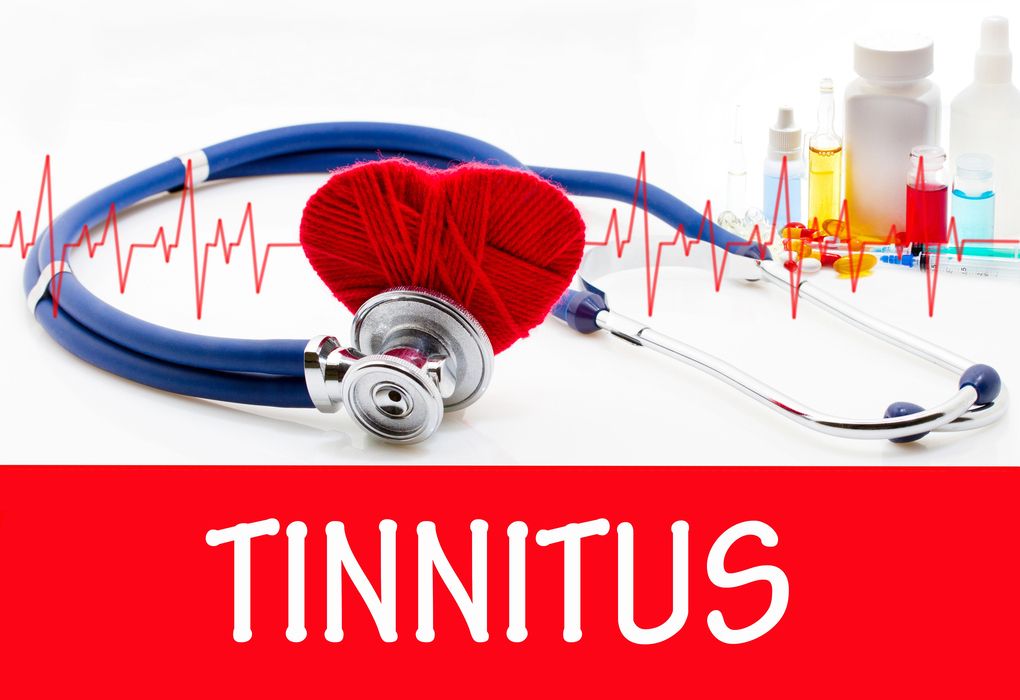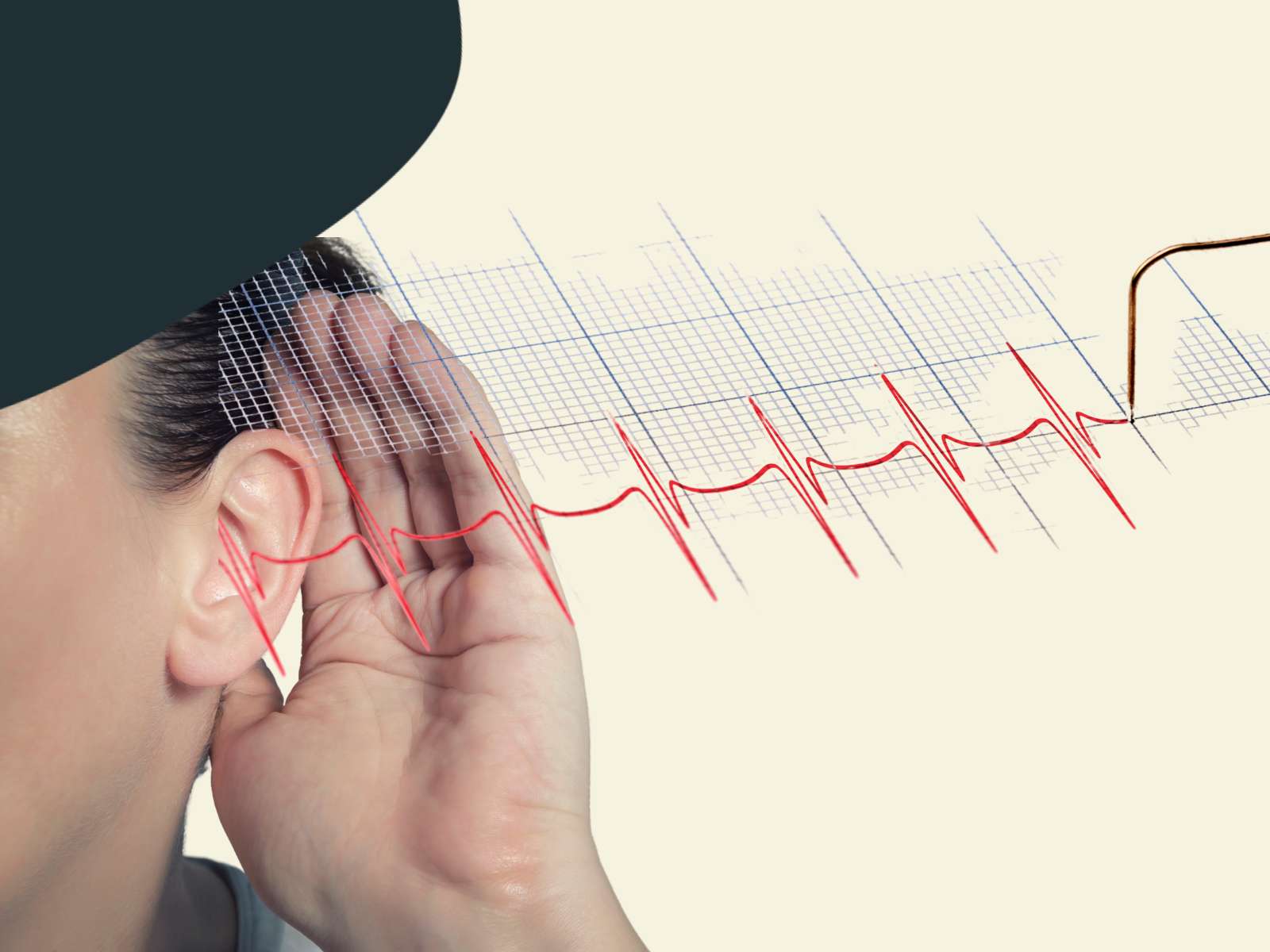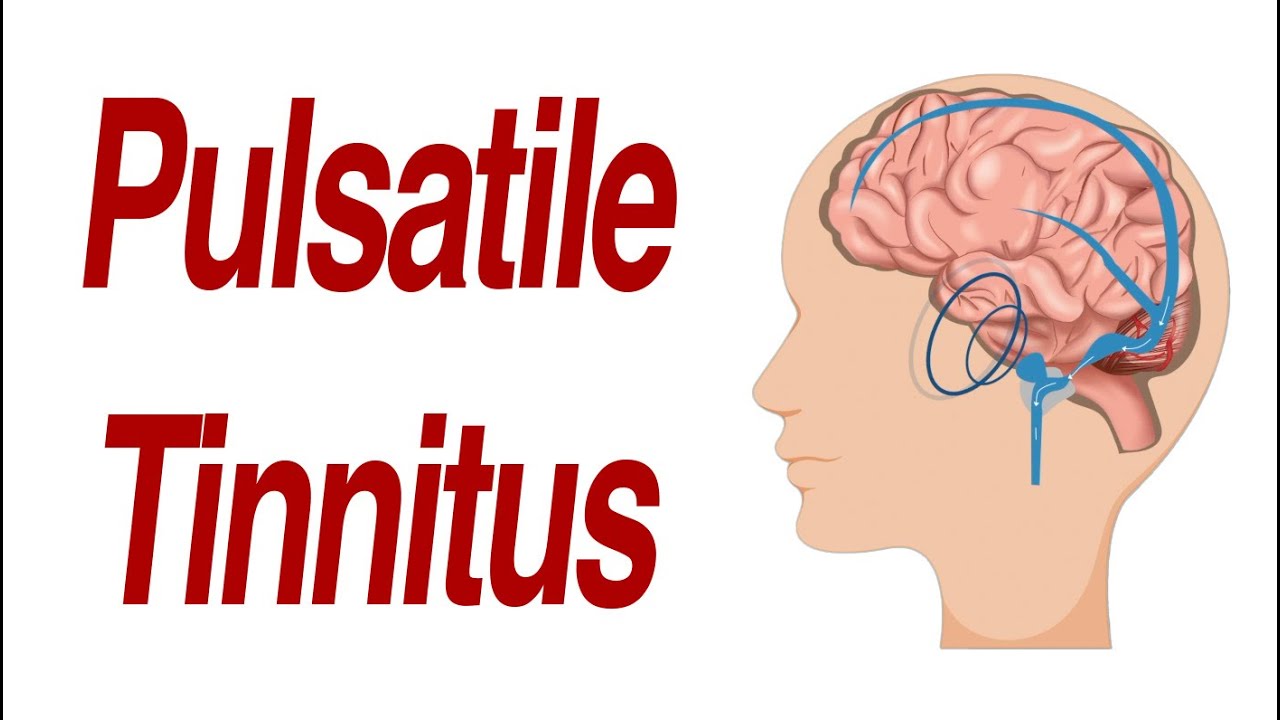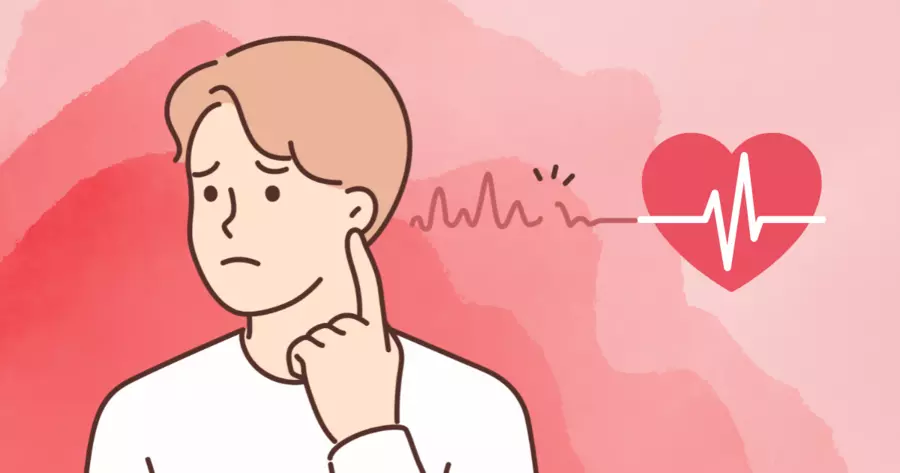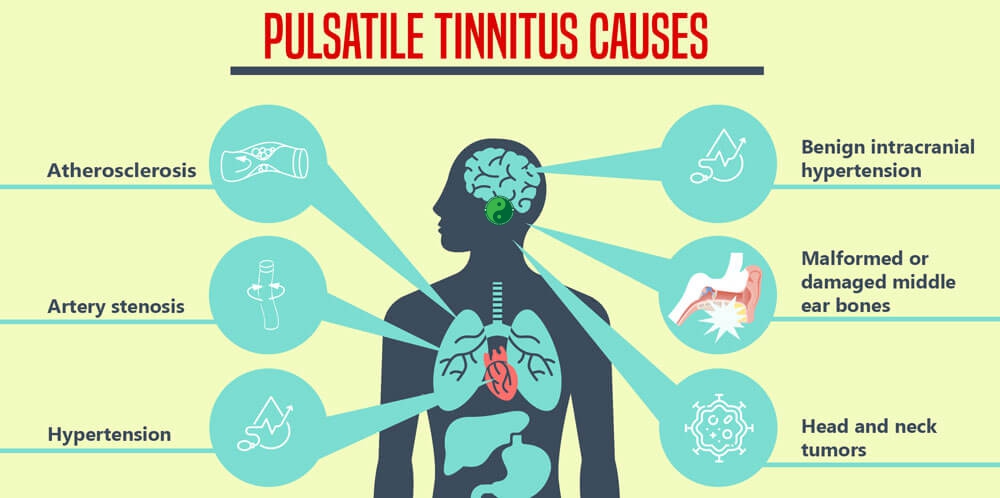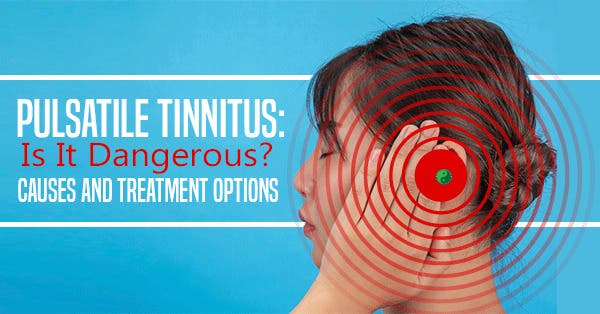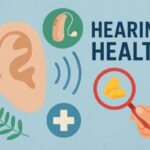Key Takeaways
- Hearing your heartbeat in your ear (pulsatile tinnitus) is often caused by changes in blood flow near your ear and affects nearly five million Americans.
- While sometimes harmless, pulsatile tinnitus can indicate serious conditions like high blood pressure, vascular abnormalities, or even tumors.
- One-sided pulsatile tinnitus warrants more immediate medical attention than symptoms occurring in both ears.
- Temporary causes like exercise, stress, or ear infections often resolve without treatment, but persistent symptoms should be evaluated by a healthcare provider.
- Diagnosis typically involves physical examination, blood tests, and imaging studies to identify the underlying cause.
That rhythmic pulsing sound in your ear that matches your heartbeat isn’t just annoying—it could be your body trying to tell you something important. While often harmless, this symptom sometimes signals underlying health issues that deserve attention.
That Throbbing Sound in Your Ear: What’s Really Happening
“How to Stop Whooshing Sound in Ear …” from directhearing.com and used with no modifications.
The swooshing, whooshing, or thumping sound you hear is essentially the sound of your own blood circulation. Unlike typical ear ringing that produces a constant tone, this rhythmic sound synchronizes perfectly with your pulse. It can be soft or loud, intermittent or persistent, and may affect one or both ears.
This phenomenon occurs when the normal flow of blood through vessels near your ear becomes turbulent or when your awareness of these normal sounds increases. Think of it like placing your ear against a seashell—except instead of ocean sounds, you’re hearing the river of blood flowing through your body.
Why You Can Hear Your Pulse in Your Ear
Your ears are incredibly sensitive organs positioned close to major blood vessels, including the carotid artery and jugular vein. Under normal circumstances, blood flows through these vessels silently. However, certain conditions can make this flow turbulent or more audible. If you’re experiencing persistent ringing or buzzing sounds, you might want to explore causes and relief for buzzing in ears.
The ear’s proximity to these vessels creates the perfect conditions for sound transmission. When blood flow changes—either due to increased pressure, narrowed vessels, or abnormal formations—the turbulence creates sound waves that your inner ear detects. Essentially, you’re literally hearing your own cardiovascular system at work.
In some cases, it’s not that the blood flow has changed, but rather your ability to hear it has increased. This heightened awareness can happen when there’s less environmental noise (like when trying to sleep) or when conditions in your middle ear change. For those experiencing ringing in the ears, you might find it helpful to explore quick relief tips for tinnitus.
Medical Term: Pulsatile Tinnitus
The medical community refers to this symptom as “pulsatile tinnitus.” Unlike regular tinnitus, which typically produces a steady ringing, buzzing, or hissing sound, pulsatile tinnitus has a distinct rhythm that matches your heartbeat. Medical professionals further classify it as either “objective” (when a doctor can also hear it with a stethoscope) or “subjective” (when only the patient can hear it).
While regular tinnitus affects about 15-20% of people, pulsatile tinnitus is much rarer, occurring in only about 4% of tinnitus cases. This distinction is important because the causes and treatments differ significantly from those of regular tinnitus.
Common Causes of Hearing Your Heartbeat in Your Ear
“I Can Hear My Heartbeat In My Ear: An …” from www.soundly.com and used with no modifications.
Pulsatile tinnitus stems from numerous conditions that affect blood flow or your ear’s ability to detect it. Some causes are benign and temporary, while others may require medical intervention. Understanding these causes helps determine when you should seek medical attention versus when you can safely monitor symptoms at home. For more insights, you might want to explore how to stop buzzing in ears and related treatments.
Temporary Causes That Usually Resolve on Their Own
Not all instances of hearing your heartbeat require medical intervention. Several common and generally harmless situations can temporarily cause this symptom. These typically resolve once the triggering condition passes, and rarely indicate serious health concerns.
Being aware of these temporary causes can help you determine whether your symptoms warrant medical attention or simple home monitoring. If your symptoms align with these situations and resolve when the situation ends, you can likely manage them without medical intervention. For more information on related symptoms, you can refer to this article on pulsatile tinnitus.
Exercise and Physical Exertion
During intense physical activity, your heart pumps harder and faster to deliver oxygen-rich blood to working muscles. This increased cardiac output naturally creates more turbulent blood flow, which can temporarily make your heartbeat audible in your ears. The effect is particularly noticeable during activities that raise your heart rate significantly, such as running, cycling, or high-intensity interval training.
Additionally, exercise often causes a temporary rise in blood pressure, which can amplify this effect. The good news is that this type of pulsatile tinnitus typically subsides within minutes after your workout ends and your cardiovascular system returns to its resting state.
If you consistently notice this symptom during moderate exercise, or if it persists long after your workout ends, it might be worth discussing with your healthcare provider to ensure your blood pressure is properly controlled.
Stress and Anxiety
Stress and anxiety trigger your body’s fight-or-flight response, releasing hormones like adrenaline that increase heart rate and blood pressure. This physiological response can make your heartbeat more pronounced and audible in your ears. During particularly stressful periods, your heightened awareness of bodily sensations may also make you more conscious of sounds you might otherwise ignore. If you’re experiencing these symptoms, you might be interested in exploring quick relief tips for tinnitus.
Many people notice pulsatile tinnitus during high-stress situations or when trying to fall asleep after a stressful day. Practicing relaxation techniques such as deep breathing, meditation, or progressive muscle relaxation can often help reduce both the anxiety and the associated pulsatile tinnitus. If stress-related pulsatile tinnitus becomes chronic, addressing the underlying anxiety with professional help may be beneficial.
Ear Infections and Congestion
When your ear becomes infected or congested with fluid, the normal acoustics inside your ear change dramatically. This altered environment can amplify internal sounds, including your heartbeat. Middle ear infections (otitis media) are particularly known for causing temporary pulsatile tinnitus, especially in children.
Congestion from colds, allergies, or sinus infections can similarly affect the pressure and fluid levels in your ear, making your pulse more audible. These causes typically resolve when the underlying infection or congestion clears, either naturally or with appropriate treatment like antibiotics, decongestants, or antihistamines.
Medical Conditions That Cause Pulsatile Tinnitus
“Pulsatile Tinnitus: 7 Different …” from www.youtube.com and used with no modifications.
Beyond temporary causes, several medical conditions can lead to persistent pulsatile tinnitus. These conditions generally affect blood vessel function or structure, or alter the ear’s ability to process sound normally. Identifying these causes often requires medical evaluation and may need specific treatments to address both the underlying condition and the symptom of hearing your heartbeat.
Understanding these potential medical causes helps explain why healthcare providers take pulsatile tinnitus seriously and often recommend thorough evaluation rather than simply dismissing it as a minor annoyance. Many of these conditions are treatable, and addressing them can both resolve the pulsatile tinnitus and prevent more serious complications.
High Blood Pressure
Hypertension (high blood pressure) is one of the most common causes of pulsatile tinnitus. When blood pressure rises, the increased force of blood flowing through your arteries creates more turbulence, which can become audible. This connection explains why many people first notice pulsatile tinnitus during periods of stress or after consuming stimulants like caffeine that temporarily raise blood pressure.
If hypertension is the underlying cause, treating and controlling your blood pressure often reduces or eliminates the pulsatile tinnitus. This typically involves lifestyle modifications such as reducing sodium intake, increasing physical activity, limiting alcohol, and sometimes taking prescription medications. Regular blood pressure monitoring becomes essential for both managing the pulsatile tinnitus and protecting your overall cardiovascular health.
Atherosclerosis and Carotid Artery Disease
As we age, our arteries can develop plaque buildup (atherosclerosis) that narrows the vessels and changes blood flow patterns. When this affects the carotid arteries in your neck—major vessels that supply blood to your brain and are located close to your ears—the turbulent blood flow can create audible sounds. This condition, called carotid artery disease, is a significant cause of pulsatile tinnitus, particularly in older adults or those with cardiovascular risk factors.
The sound typically appears more pronounced on the affected side. Because carotid artery disease increases stroke risk, pulsatile tinnitus associated with this condition warrants prompt medical evaluation. Treatment may include cholesterol-lowering medications, blood thinners, and in severe cases, surgical procedures to remove blockages. For more information on potential relief methods, explore various tinnitus relief tips.
Anemia and Blood Flow Changes
Anemia—a condition characterized by low red blood cell count or hemoglobin levels—alters blood flow dynamics throughout the body. Your heart pumps harder and faster to compensate for the reduced oxygen-carrying capacity of your blood, which can make your heartbeat more audible. Additionally, anemic blood is less viscous (thinner), which changes how it flows through vessels near your ear.
People with severe anemia often report hearing their heartbeat not just in their ears but also feeling it throughout their body. Treating the underlying anemia through iron supplements, dietary changes, or addressing the cause of blood loss typically resolves the associated pulsatile tinnitus. Routine blood tests can identify anemia and help monitor treatment effectiveness.
Middle Ear Effusion
Fluid accumulation in the middle ear, known as middle ear effusion, significantly changes how sound is transmitted through your ear. This condition commonly occurs after upper respiratory infections, allergic reactions, or changes in air pressure (like during air travel). The fluid creates an environment where internal sounds—including your heartbeat—become more noticeable.
Middle ear effusion usually resolves on its own within several weeks, though persistent cases may require medical intervention. Your doctor might recommend decongestants, antihistamines, or in some cases, a minor procedure to drain the fluid. Once the effusion clears, the pulsatile tinnitus typically disappears as well.
Eustachian Tube Dysfunction
The Eustachian tube connects your middle ear to the back of your throat, helping equalize pressure on both sides of your eardrum. When this tube functions improperly—either staying too open or failing to open adequately—it can cause significant changes in middle ear pressure and function. This dysfunction often makes internal sounds like your heartbeat much more noticeable.
People with Eustachian tube dysfunction may notice their pulsatile tinnitus worsens when they change positions, particularly when lying down. Treatment approaches range from simple maneuvers like yawning or chewing gum to medications that reduce inflammation around the tube. In chronic cases, minimally invasive procedures to improve Eustachian tube function might be considered.
When to Be Concerned About Hearing Your Heartbeat
“Hearing Your Heartbeat in Only One Ear …” from www.myphteam.com and used with no modifications.
While hearing your heartbeat in your ear isn’t always serious, certain patterns and accompanying symptoms warrant prompt medical attention. Understanding these warning signs helps you distinguish between benign, self-limiting causes and those requiring evaluation by a healthcare professional.
As a general guideline, new-onset pulsatile tinnitus should be evaluated by a healthcare provider, particularly if it persists for more than a week or is accompanied by other symptoms. Even when the cause turns out to be benign, proper evaluation provides peace of mind and may catch serious conditions in their early, more treatable stages.
Medications That Help
Depending on the underlying cause, several medications can effectively reduce or eliminate pulsatile tinnitus. For hypertension-related cases, blood pressure medications like beta-blockers, ACE inhibitors, or diuretics often provide relief by normalizing blood flow. Anticoagulants or blood thinners may help when blood viscosity issues contribute to the symptom. For inflammatory conditions affecting the ear, corticosteroids can reduce swelling and improve symptoms within days.
Surgical Interventions When Necessary
In cases where pulsatile tinnitus stems from structural abnormalities, surgical intervention may offer the best chance for resolution. Procedures range from minimally invasive embolization techniques for vascular malformations to more complex surgeries for conditions like glomus tumors. Stenting procedures can open narrowed blood vessels causing turbulent flow, while specialized surgeries can repair dehiscent superior semicircular canals. Most surgical approaches boast success rates between 70-90% for properly selected candidates, though recovery times and potential complications vary by procedure type. For those exploring non-surgical options, understanding tinnitus treatment medication can also be beneficial.
Self-Care Strategies to Reduce Pulsatile Tinnitus
“Pulsatile Tinnitus – Philadelphia …” from philaholisticclinic.com and used with no modifications.
While medical treatment addresses underlying causes, several self-care approaches can help manage symptoms and improve quality of life. These strategies work best as complementary approaches alongside proper medical care rather than as substitutes for professional evaluation. For more information on this condition, you can visit this Cleveland Clinic resource.
Many people find combining several strategies provides the most effective relief, especially when pulsatile tinnitus stems from multiple contributing factors. Consistency with these approaches typically yields better results than sporadic implementation.
Lifestyle Changes That Improve Symptoms
Simple modifications to daily habits can significantly impact pulsatile tinnitus symptoms. Limiting salt intake reduces fluid retention and blood pressure, directly affecting blood flow dynamics. Regular cardiovascular exercise strengthens your heart and improves vascular health, though you might need to avoid high-intensity workouts that temporarily worsen symptoms. Reducing caffeine, alcohol, and nicotine consumption helps stabilize blood pressure and improves sleep quality. Maintaining healthy weight and cholesterol levels reduces strain on your cardiovascular system, often diminishing the intensity of pulsatile tinnitus over time. For more information on managing tinnitus, consider exploring tinnitus management strategies.
Sound Masking Techniques
Effective Sound Masking Options for Pulsatile Tinnitus
- White noise machines (especially effective during sleep)
- Nature sound recordings (rainfall, ocean waves, forest sounds)
- Low-volume background music without pronounced bass
- Desktop fountains or other sources of flowing water sounds
- Sound therapy apps with customizable frequencies
Sound masking works by introducing pleasant or neutral background sounds that reduce awareness of the pulsatile tinnitus. This technique proves particularly helpful at night when quiet environments make the pulsing sound more noticeable. Unlike traditional tinnitus, which responds well to specific frequency masking, pulsatile tinnitus often requires sounds that mimic or complement its rhythmic nature.
Many patients find that sounds with natural rhythm variations work better than constant tones. White noise machines with adjustable settings allow you to find the most effective sound profile for your specific symptoms. Modern hearing aids sometimes include masking features specifically designed for various tinnitus types.
For daytime management, environmental sound enrichment—simply having background noise from a radio, fan, or open window—can provide significant relief without disrupting daily activities. The goal isn’t to completely drown out the pulsatile tinnitus but rather to reduce its prominence in your auditory awareness.
Stress Reduction Methods
Since stress can both cause and exacerbate pulsatile tinnitus, stress management techniques offer powerful tools for symptom control. Mindfulness meditation has shown particular promise, with research indicating it can reduce tinnitus-related distress by helping practitioners separate the physical sensation from emotional reactions to it. Progressive muscle relaxation and guided imagery provide structured approaches to reducing physical tension that often accompanies and worsens tinnitus perception. Cognitive behavioral therapy (CBT) helps reframe negative thoughts about the condition, reducing the anxiety that often makes symptoms seem more intrusive.
Even simple breathing exercises practiced for just a few minutes several times daily can lower blood pressure, reduce stress hormones, and diminish the perceived intensity of pulsatile tinnitus. Many patients report that consistent practice of these techniques not only improves their tinnitus symptoms but also enhances overall well-being and sleep quality.
Living With Persistent Pulsatile Tinnitus
“What is pulsatile tinnitus …” from patch.com and used with no modifications.
For some individuals, pulsatile tinnitus becomes a chronic condition that requires ongoing management rather than complete resolution. Accepting this reality without letting it dominate your life represents an important psychological step. Support groups, both online and in-person, connect you with others facing similar challenges and provide valuable coping strategies. Maintaining perspective helps—remembering that while annoying, the condition itself is rarely dangerous once serious causes have been ruled out. Many patients report that over time, their brains naturally habituate to the sound, making it less noticeable even when objectively present.
Developing a personal toolkit of management strategies allows you to adjust approaches based on symptom fluctuations. Some find keeping a symptom journal helps identify triggers and effective interventions. Remember that even persistent pulsatile tinnitus often responds to treatment of contributing factors like blood pressure, and new treatment options continue to emerge as research advances. Working with healthcare providers who take your symptoms seriously ensures you benefit from the latest management approaches.
Frequently Asked Questions
The following questions address common concerns about hearing your heartbeat in your ear. While these answers provide general information, remember that individual medical situations vary, and consulting with a healthcare provider remains the best way to address your specific circumstances.
Can pregnancy cause you to hear your heartbeat in your ear?
Yes, pregnancy commonly causes temporary pulsatile tinnitus due to several physiological changes. Blood volume increases by up to 50% during pregnancy, creating greater blood flow and potential turbulence. Hormonal changes affect blood vessel dilation and fluid retention, both of which can alter sound transmission in the ear. Most pregnancy-related pulsatile tinnitus resolves after delivery as the body returns to its non-pregnant state. However, if the symptom is severe or accompanied by high blood pressure, headaches, or visual changes, it requires immediate medical attention as it could indicate pregnancy-induced hypertension or preeclampsia.
Is it normal to hear your heartbeat in your ear when lying down?
Occasionally hearing your heartbeat when lying down, particularly on your side with your ear against the pillow, is relatively common and usually harmless. This position can compress the jugular vein or carotid artery, temporarily changing blood flow patterns and making your pulse more audible. Many people notice this phenomenon more when trying to fall asleep in a quiet environment where subtle sounds become more apparent. However, if this symptom is new, persistent every night, or particularly loud, it merits discussion with your healthcare provider to rule out potential underlying causes requiring attention.
Can hearing your pulse in your ear be a sign of heart problems?
While pulsatile tinnitus itself is rarely directly caused by heart problems, it can sometimes indicate cardiovascular conditions that warrant attention. High output cardiac states like anemia, hyperthyroidism, or pregnancy can increase cardiac output and create audible pulsations. Heart valve abnormalities occasionally produce sounds that transmit to the ear, though this typically causes heart murmurs detectable by stethoscope rather than subjective pulsatile tinnitus. For more insights into managing tinnitus, consider exploring tinnitus treatment options.
More commonly, pulsatile tinnitus relates to blood vessel conditions that may indirectly connect to heart health, such as hypertension or atherosclerosis. Any new pulsatile tinnitus deserves evaluation, particularly in people with existing cardiovascular risk factors or heart disease.
How long does pulsatile tinnitus typically last?
The duration of pulsatile tinnitus varies dramatically depending on its cause. Temporary causes like stress, exercise, or minor ear congestion typically resolve within hours to days as the triggering condition subsides. Infection-related cases generally improve within 1-2 weeks with appropriate treatment. For cases related to underlying medical conditions like hypertension or vascular abnormalities, the pulsatile tinnitus often persists until the condition is effectively treated.
Without treatment, some forms of pulsatile tinnitus can become chronic, lasting months or years. This highlights the importance of proper diagnosis rather than simply enduring the symptom. Even long-standing pulsatile tinnitus often improves with appropriate interventions targeting the specific cause.
Can allergies cause you to hear your heartbeat in your ear?
Allergies frequently contribute to pulsatile tinnitus through several mechanisms. Allergic reactions cause inflammation and fluid buildup in the middle ear and Eustachian tube, altering sound transmission and potentially amplifying internal sounds like your heartbeat. The congestion associated with allergic rhinitis creates pressure changes that affect how sound travels through your ear structures. Additionally, many allergy medications, particularly decongestants, can temporarily raise blood pressure or cause stimulation that increases awareness of your pulse. For more insights, you might want to explore common tinnitus questions answered by top audiologists.
If allergies trigger your pulsatile tinnitus, you’ll likely notice the symptoms worsen during allergy seasons or after exposure to specific allergens. Properly managing allergies through antihistamines, nasal steroids, or allergen avoidance often reduces or eliminates the associated pulsatile tinnitus. For severe or persistent cases, consultation with an allergist alongside ENT evaluation may provide the most comprehensive approach.
